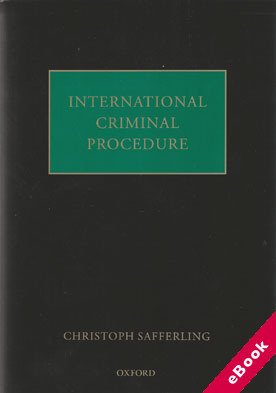
The device(s) you use to access the eBook content must be authorized with an Adobe ID before you download the product otherwise it will fail to register correctly.
For further information see https://www.wildy.com/ebook-formats
Once the order is confirmed an automated e-mail will be sent to you to allow you to download the eBook.
All eBooks are supplied firm sale and cannot be returned. If you believe there is a fault with your eBook then contact us on ebooks@wildy.com and we will help in resolving the issue. This does not affect your statutory rights.
This book sets out and analyses the procedural law applied by international criminal tribunals and the International Criminal Court (ICC).
It traces the development of international criminal procedure from its roots in the International Military Tribunal at Nuremberg to its current application by the Yugoslav and Rwanda Tribunals, the Special Court for Sierra Leone, the Extraordinary Chamber in the Courts of Cambodia, and the International Criminal Court. All of these tribunals apply a different set of rules.
The focus of this book, however, lies on the ICC and its procedural regime as contained in the Rome Statute, the Rules of Procedure and Evidence, and the different Regulations of the Court and of the Prosecutor.
The exceptional compromise between common and civil law which formed the basis of the ICC's Statute created a unique procedural order. This book systematically analyses the Court's organisational structure, overall procedural setting, and the individual procedural regulations, and compares and contrasts these to other international criminal tribunals.
Amongst the many unresolved procedural issues are the rights of the accused before, during, and after the trial, the disclosure of evidence, the presentation of evidence, the participation of victims, the protection of witnesses, and the cooperation between the ICC and individual states.
Through looking at these issues, the book develops a concise and fitting theoretical underpinning for the ICC's procedural order that is not founded on any specific legal culture.